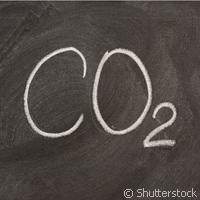New study shows ocean's carbon catching ability under threat
The ocean is Earth's biggest tool in managing emissions, soaking up nearly one third of all human carbon emissions. But how long can the planet's largest carbon absorber keep this up for? Now, a team of international EU-funded researchers has analysed how climate change is affecting the ocean's capacity to guzzle up carbon emissions. As the biggest natural carbon sink, a natural or artificial reservoir that accumulates and stores carbon-containing chemical compounds for an indefinite period by removing it from the atmosphere, the ocean is vital for offsetting carbon emissions. And worryingly, findings from the Franco-American study, published in the journal Nature Geoscience, show that indeed climate change is having a negative effect on this natural carbon sponge. 'The ocean is taking up less carbon because of the warming caused by the carbon in the atmosphere,' says Galen McKinley, one of the study's researchers from the University of Wisconsin-Madison. With a boost of EUR 14,498,400 as part of the 'Marine carbon sources and sinks assessment' (CARBOOCEAN) project funded under the 'Sustainable Development, Global Change and Ecosystems' Thematic area of the Sixth Framework Programme (FP6), the team moved research in this field on from previous works that have used a much smaller range of sampling sites. One of the biggest stumbling blocks in ocean analysis is the lack of available data and scientists are often obliged to stick to existing shipping and boat routes for data gathering. Instead of going down these well-trodden research paths, the team members expanded their analysis by using existing data from 1981 to 2009, as well as a variety of different methodologies and locations across the North Atlantic. They found a high degree of natural variability that often covered up longer term patterns of change and could explain why previous conclusions have contradicted each other. They discovered that apparent trends in ocean carbon uptake are highly dependent on exactly when and where you look - on the 10 to 15-year time scale, even overlapping time intervals sometimes turn up conflicting results. 'Because the ocean is so variable, we need at least 25 years worth of data to really see the effect of carbon accumulation in the atmosphere,' says Galen McKinley. 'This is a big issue in many branches of climate science - what is natural variability, and what is climate change?' Working with nearly three decades of data, the researchers were able to cut through the variability and identify underlying trends in the surface carbon dioxide (CO2) throughout the North Atlantic. Over the past 30 years, as atmospheric carbon dioxide has greatly increased, so has dissolved carbon dioxide in seawater. The gases equilibrate across the air-water interface, influenced by how much carbon is in the atmosphere and the ocean and how much carbon dioxide the water is able to hold as determined by its water chemistry. But the researchers found that rising temperatures are slowing down this carbon absorption across a large part of the subtropical North Atlantic. As the ocean's carbon capacity decreases as it warms up, warmer water is not able to hold as much carbon dioxide. Many scientists have looked for indications that the carbon content of the ocean is rising faster than that of the atmosphere when analysing the effects of increasing atmospheric carbon on the ocean's uptake. Galen McKinley explains how their results show that the ocean sink can weaken without this warning sign. 'More likely what we're going to see is that the ocean will keep its equilibration but it doesn't have to take up as much carbon to do it because it's getting warmer at the same time. We are already seeing this in the North Atlantic subtropical gyre, and this is some of the first evidence for climate damping the ocean's ability to take up carbon from the atmosphere.' The team now hopes to see this type of analysis carried out on other oceans too. The CARBOOCEAN project, which ran from 2005 to 2009, aimed to accurately assess marine carbon sources and sink and cut through existing uncertainties in the quantification of net annual air-sea CO2 fluxes by a factor of 2 for the world ocean and by a factor of 4 for the Atlantic Ocean. With 35 project partners making up the consortium, the overall aim of all the various studies is to make predictions about the future of our oceans. The main types of research used by the consortium partners was extensive large-scale observations, process studies and advanced computer models focusing on all quantitatively important aspects to the problem.For more information, please visit:University of Wisconsin-Madison:http://www.wisc.edu/
Countries
France, United States



